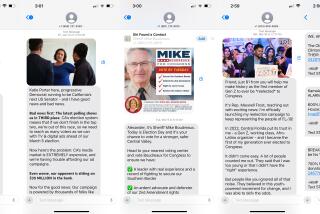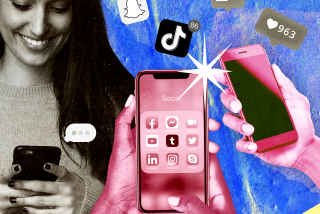Americans have gone text-crazy
- Share via
We’re becoming a nation of texters.
According to data released Tuesday by the Census Bureau, Americans fired off 110 billion text messages in December 2008. In the same month in 2007, they sent 48 billion.
Not surprisingly, the trend is especially prevalent among teenagers, said Amanda Lenhart, a senior research specialist for the Pew Internet and American Life Project.
“Teens are still developing their communication habits. Adults have preset ones already,” she said.
The data are part of the Statistical Abstract of the United States, a document compiled annually by the Census Bureau that quantifies various aspects of American life, such as how many people buy lottery tickets.
The information on texting was compiled by the CTIA -- the Wireless Assn., a trade group that conducts a semiannual survey of cellphone providers.
So why is texting a teen trend?
It’s efficient, and it’s private. Teens can text silently in a car’s back seat or in the family room without potential for embarrassment, Lenhart said.
The texts might be mundane -- maybe a simple emoticon or a LOL (laugh out loud), but it’s a way for young people to maintain a connection throughout the day.
“Text messaging seems to cut through some of the extraneous conversation that teens don’t want to have,” Lenhart said.
Not that teens are the only texters.
About 65% of adults send or receive texts as well, although Lenhart guesses young adults are far more likely to text than older people are.
Texting is convenient, fast and doesn’t require full attention, said Tim Groeling, an associate professor of communication studies at UCLA.
“It’s the best of both worlds,” said Groeling, who added that he’d rather talk by voice or e-mail.
Though the number of texts may be increasing exponentially, they’re not increasing monthly cellphone bills. Between 2003 and 2008 the average bill has stayed constant at about $50.
Groeling said the abundant texting is a change that shows how society is becoming less personal.
“I don’t think it will lead to shallow relationships,” he said. “I do think it will lead to a withering of interpersonal skills.”
Numbers compiled by the wireless association also show that people sent 71% more text messages in June 2009 compared with the same period the previous year.
“Texting does have the ability to change how we think about communicating with each other,” Lenhart said.
Even so, people are still going to want the verbal cues, such as tone of voice, that texts can’t always convey.
“There’s a lot of information that comes across through sound that doesn’t come through text,” Lenhart pointed out.
The rise in texting has had another quantifiable effect, according to the Census Bureau. Cellphone calls have gotten a little shorter.
In 2008, the average call’s duration was 2.27 minutes. From 2004 to 2006, it was about 3 minutes.
More to Read
Sign up for Essential California
The most important California stories and recommendations in your inbox every morning.
You may occasionally receive promotional content from the Los Angeles Times.











